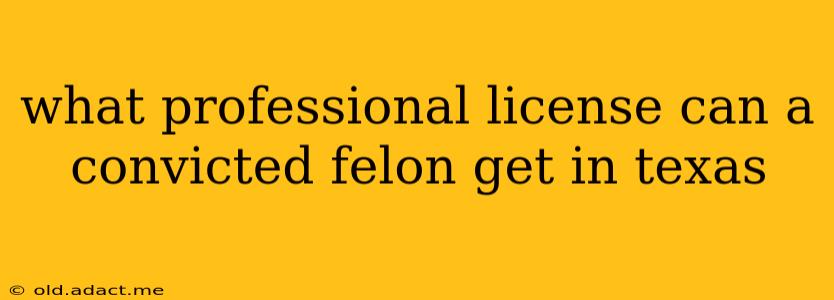What Professional Licenses Can a Convicted Felon Get in Texas?
Navigating the process of obtaining a professional license in Texas after a felony conviction can be complex and challenging. The eligibility criteria vary significantly depending on the specific license, the nature of the felony, and the details of the conviction. There's no single, simple answer, as each case requires individual evaluation. However, this guide will outline the general process and considerations for felons seeking professional licenses in Texas.
Understanding Texas's Licensing Process for Felons:
The Texas Department of Licensing and Regulation (TDLR) oversees the licensing of numerous professions. While some licenses automatically disqualify individuals with felony convictions, others allow for application with specific stipulations or waivers. The key factors influencing eligibility include:
- The nature of the felony: Felonies involving dishonesty, violence, or those directly related to the profession in question will generally pose significant barriers to licensure.
- The severity of the felony: The punishment (jail time, probation, etc.) associated with the conviction will be considered.
- Time elapsed since conviction: Many licenses require a certain number of years to pass after completion of probation or parole before applicants can even be considered.
- Rehabilitation efforts: Demonstrating rehabilitation through participation in programs such as substance abuse treatment, anger management, or community service can significantly strengthen an application.
How to Determine Eligibility:
-
Identify the desired license: Start by determining the specific professional license you're interested in obtaining. This could range from cosmetology to real estate to contracting.
-
Consult the TDLR website: The TDLR website (www.tdlr.texas.gov) is the primary resource for licensing information. Each profession's licensing requirements are detailed on their respective pages. Look for sections explicitly addressing felony convictions or moral character requirements.
-
Review the application: Download the application for the specific license you seek. It will likely contain specific questions regarding criminal history. Be completely truthful and transparent in your responses.
-
Seek legal counsel: Due to the complexities involved, consulting with a qualified Texas attorney specializing in licensing matters is strongly recommended. They can provide personalized guidance based on your specific circumstances and assist with navigating the application process.
H2: Common Questions about Felon Licensing in Texas
What are some professions that might be more accessible to felons in Texas?
While there are no guarantees, some professions might be relatively more accessible compared to others. The likelihood of approval often depends on how directly the felony relates to the job duties and the applicant’s demonstration of rehabilitation. This information should not be interpreted as definitive eligibility criteria. Always check the specific TDLR requirements.
Can I get a professional license in Texas if I have a felony conviction for fraud?
A felony conviction for fraud would severely limit your options. Licenses involving handling finances, such as those in accounting, financial advising, or real estate, would be extremely difficult to obtain. The nature of the crime directly contradicts the expected ethical conduct and trustworthiness required for these professions.
How long after my felony conviction can I apply for a professional license in Texas?
The waiting period varies widely among professions. Some may require a certain number of years after the completion of probation or parole, while others may have no specific waiting period but require demonstrating substantial rehabilitation and good character for years. Check the specific requirements for your desired license.
What evidence can I submit to demonstrate rehabilitation?
Evidence of rehabilitation is crucial in demonstrating fitness for licensure. Strong examples include completion certificates from programs such as substance abuse treatment, anger management courses, or mental health therapy. Letters of recommendation from employers, mentors, or community leaders attesting to positive behavioral changes are also valuable. Proof of sustained employment and community involvement can further strengthen your application.
Disclaimer: This information is for general guidance only and should not be considered legal advice. The laws and regulations regarding professional licensing in Texas are complex and subject to change. Always consult with a qualified Texas attorney and refer to the official TDLR website for the most up-to-date information.
